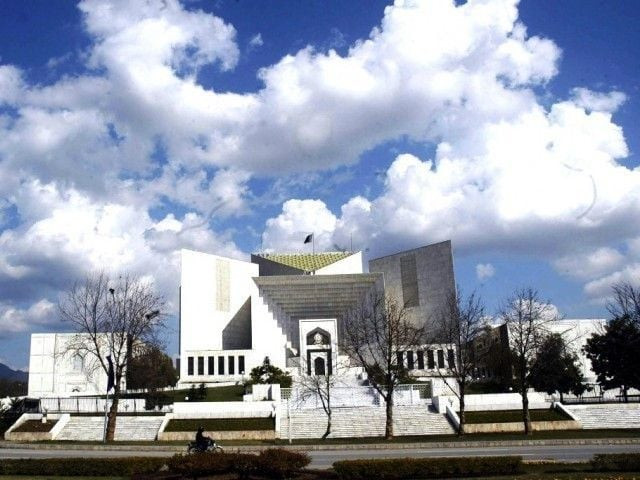Housing for low-income group: Civic agency’s anti-poor stance annoys SC
Civic agency accuses petitioners of having ‘ulterior motives’

A file photo of the Supreme Court of Pakistan. PHOTO: EXPRESS
A division bench of the Supreme Court headed by Justice Azmat Saeed on Wednesday lamented that the federal and provincial governments are not giving attention to the construction of reasonable housing facilities for low-income groups.
“They (governments) believe that 60 per cent of the population which lives below subsistence level does not exist at all,” observed Justice Sheikh Azmat Saeed, head of the three-judge bench.
The bench observed that the reports submitted by the CDA and the federal as well as the provincial governments were inconclusive.
Justice Dost Mohammad Khan, another member of the bench, pointed out that even the governments did not allocate money for the construction of housing schemes for low-income groups in the upcoming annual budget, despite the fact that the manifestoes of all the major political parties pledged to provide the same.
“The impression I have gathered after going through the reports and the previous orders of the court was that the government is not interested in providing housing to the destitute and low-income groups,” observed Justice Saeed.
During the proceedings, Law and Justice Commission of Pakistan Secretary Sarwar Khan, who was previously asked by the court to hold a meeting to develop a uniform housing policy with the provincial governments, lamented that what transpired after two meetings was that no coordinated policy on housing exists.
The Capital Development Authority (CDA) has refused to accept an expert working group proposal to develop two sectors for low-income housing.
The CDA has submitted a fresh report to the apex court in the katchi abadi case, contending that the petitioners, the Awami Workers Party (AWP), did not come to the apex court with clean hands and intended to use the shoulder of the court to grab the land for their own ulterior motives.
The CDA has also pleaded to the Supreme Court to allow it to retrieve already-acquired land.
The report states that all illegal occupants of CDA land may be rehabilitated with full assistance from provincial governments through resettlement plans.
The civic body has already formulated a regulation plan, wherein it has been made mandatory for private developers to reserve 15 per cent quota in their housing schemes for small-size plots.
Bylaws for affordable housing in the CDA sectors and private housing schemes are also being prepared, wherein it has been suggested that 10 per cent of residential areas in the CDA schemes may be reserved for low-cost housing.
It was further submitted that though shelter was the right of every citizen, Islamabad cannot accommodate migrants from all over the country, and therefore, no more illegal settlements will be regularised.
There are currently no provisions in the CDA ordinance regarding regularisation of illegal settlements, so the civic agency has requested that all provincial governments, the housing ministry, the National Housing Authority, and others on the direction of the federal government take the necessary measures to resettle illegal occupants by allocating special budgets for acquisition of land at suitable locations, preferably in the hometowns of illegal occupants of the CDA land, the civic agency has also argued.
The CDA also requested the apex court to ask provincial governments to take the necessary steps to improve living standards for low-income groups by providing basic amenities such as educational, health, and recreational facilities.
It also emphasised that since Pakistan was an agriculture country, the federal and the provincial governments should formulate policies regarding improvement in the economic status of villagers.
The CDA opposed regularisation of illegal settlements or relocation within Islamabad on the grounds that most of the allottees of colonies in sectors G-7, G-8 and F-10 or Farash Town have sold their plots, despite the fact that these plots were non-transferable, and in many cases, were provided to them against monthly instalments of Rs400, totalling around Rs21,000.
The case was then adjourned indefinitely.
Published in The Express Tribune, June 2nd, 2016.


















COMMENTS
Comments are moderated and generally will be posted if they are on-topic and not abusive.
For more information, please see our Comments FAQ